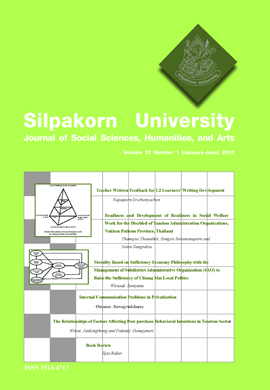Morality Based on Sufficiency Economy Philosophy with the Management of Subdistrict Administrative Organization (SAO) to Raise the Sufficiency of Chiang Mai Local Politics
Main Article Content
Abstract
This research aimed to study morality based on sufficiency economy which is appropriate to the management of subdistrict administrative organizations (SAO) and can increase the morality of these organizations when they applied this morality to their management. Quantitative analysis was used to evaluate the achievement of raising the political morality of 27 SAO in Chiang Mai which were used asthe sample in this study. Statistical Package for Social Science (SPSS) version 16 was used to analyze the data. Limited Dependent Variable Model (LIMDEP) version 9 was used to test the hypothesis.The research outcome was that integrity, diligence and lack of greed are the most appropriate forms of morality based on sufficiency economy for the management of these 27 organizations 99%, 99% and 95% level of significance respectively. These can raise morality by 36.01%. It illustrates that all of these moralities based on sufficiency economy applied in the management of SAO can reflect the image of decentralization of local political development and democracy.
Downloads
Article Details
All rights reserved. Apart from citations for the purposes of research, private study, or criticism and review,no part of this publication may be reproduced, stored or transmitted in any other form without prior written permission by the publisher.
References
Office of Permanent Secretary, Ministry of Social Development and Human Security. (2009) Index for Measuring the Socio-economic Development Based on Sufficiency Economy:Office of Permanent Secretary, Ministry of Social Development and Human Security.
Office of the National Economic and Social Development Board. (2011) The 11th National Socio Economic Developmental Plan.
Office of the National Economic and Social Development Board.Phantasean, A. (2008) Research Synthesis, Literature and Research Report of Sufficiency Economy(1999 - 2007).
Somyana, W. (2008) Learning Management for Socio-economic Development in Rural and Urban Areas, Chiang Mai Province,Research Report Submitted to the National Research Council of Thailand.
Somyana, W. (2009) Learning Management for Socio-economic Development in Rural and Urban Areas, Chiang Mai Province, Research Report Submitted to the National Research Council of Thailand.
Somyana, W. (2010) Learning Management for Socio-economic Development in Rural and Urban Areas, Chiang Mai Province, Research Report Submitted to the National Research Council of Thailand.
Sriboonchitta, S., Wiboonpongse, A., and Calkins, P. (2009) Bottom-up National Policy Guidance from the Tambon: A Recuvsive SEM Approach. The ISSAAS International Congress 2008, 23-27 February 2009, The Emerald Hotel, Bangkok, Thailand.
Wiboonpongse, A. (2008) Participatory Action Project “Learning to Develop Subdistricts Base on Sufficiency Economy”. Institute for Sufficiency Economy Research and Promotion.


